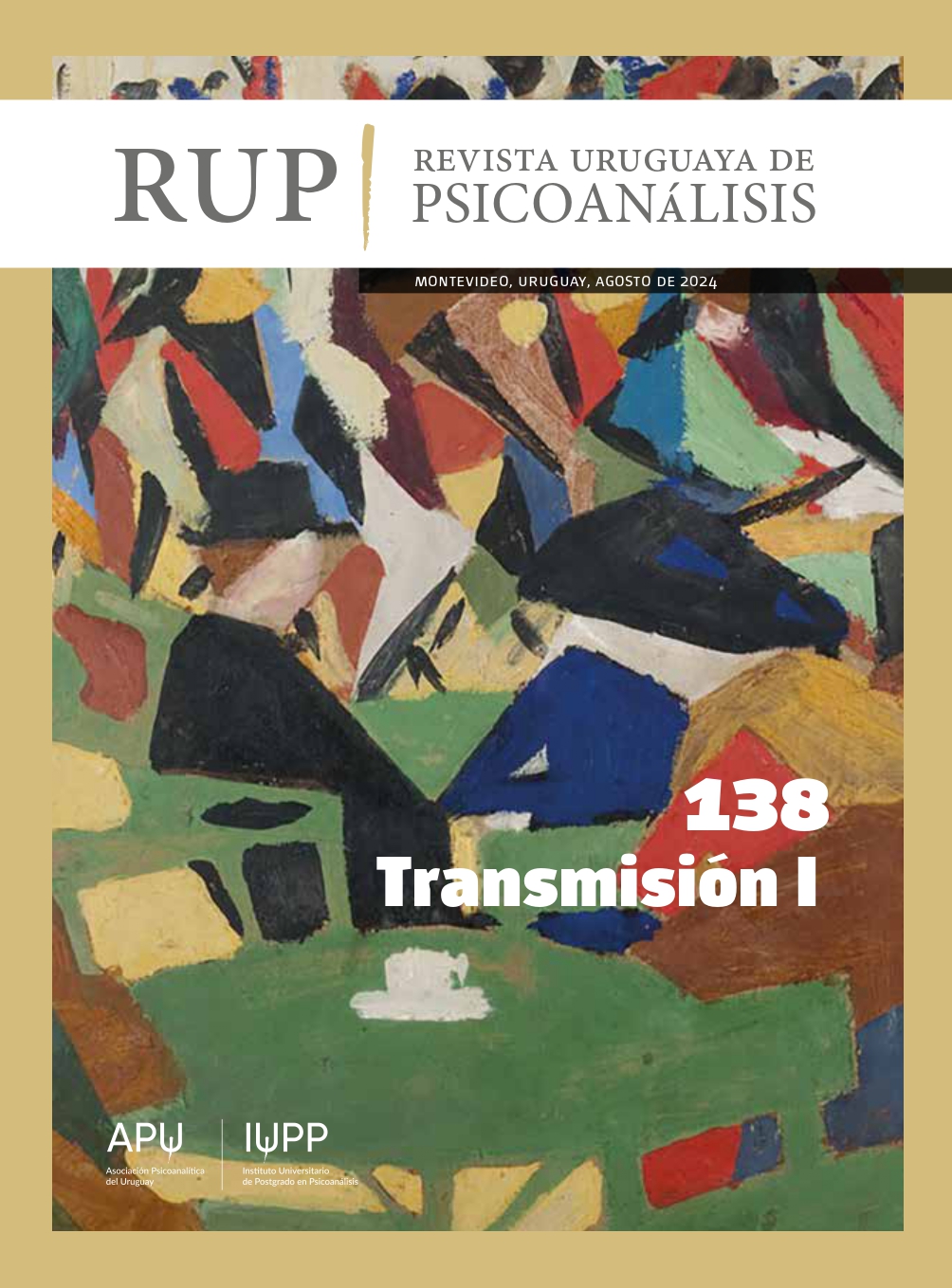Transmission and ethics in psychoanalysis
DOI:
https://doi.org/10.36496/n.138.a5Keywords:
Transmission, Psychoanalytic training, Seminar, Supervision, PluralismAbstract
Based on the work carried out over four years as coordinator of the Commission of Training and Transmission of Psychoanalysis
of Fepal, the author rescues fermental aspects of the debates and controversies brought up in pre-congresses, educational congresses and institute meetings, to continue with new reflections, the dialogue initiated with members and candidates – training analysts, predominantly from the Fepal Institutes.
The concept of transmission is discriminated from that of training and education, in the understanding that the former refers
to the unconscious dimension that must necessarily draw a mark, in the long process of acquiring analytical identity in the
three pillars of the tripod.
The epochal changes are taken into consideration, as well as the socio-cultural contexts in which each Association and Institutes
are immersed; essential changes and contexts when thinking about training programs whose central axis is the transmission of psychoanalysis.
What the effects of theoretical pluralism might have is questioned, when presented as a sum of theories hindering the
enriching and favoring power of personal thinking.
Addressing the setting and its analytical function, as a starting point of all analytical processes, while also supporting the different
elements of the method, allows the author to question the limits of their variations and updates in order to preserve the transmission of psychoanalysis.
Downloads
References
Bleger, L. (2012). La palabra, no el grado: Proceso y cursus en la formación analítica. Calibán, 10(1), 132-133.
Cabral, A. (2012). Transmisión y enseñanza: Una antigua tensión en busca de nuevas respuestas. Calibán, 10(1), 108-113.
Freud, S. (1984). Psicología de las masas y análisis del yo. En J. L. Etcheverry (trad.), Obras completas (vol. 18, pp. 63-136). Amorrortu.
(Trabajo original publicado en 1921 ).
Freud, S. (1986). Trabajos sobre técnica psicoanalítica.En J. L. Etcheverry (trad.), Obras completas (vol. 12, pp. 77-82). Amorrortu. (Trabajo original publicado en 1911-1915 [1914]).
Freud, S. (2013). Introducción del narcisismo. En J. L. Etcheverry (trad.), Obras completas (vol. 14, pp. 65-88). Amorrortu. (Trabajo original publicado en 1914).
Fulco, M. C., Casas, M., Uriarte, C. y Viñar, M. (2005). Modelo uruguayo. Secretaría de APU.
Fulco, M. C. (2013- 2015). La formación analítica: Un modelo para armar. El debate sobre el análisis de formación. Dossier del Instituto de Psicoanálisis Ángel Garma. Dossier del Instituto de Psicoanálisis Ángel Garma.
Fulco, M. C. (2015). Aspectos dogmáticos y académicos que infiltran la formación psicoanalítica. Análisis didáctico: ¿Permanencia o cambio? Trabajo presentado en el 27° Encuentro de Institutos de Fepal, Río de Janeiro.
Fulco, M. C. (2016). Panel de apertura. Congreso didáctico, Congreso de la Federación Psicoanalítica de América Latina, Cartagena.
Fulco, M. (2019). On training analysis. En A. Cabral y A. Fainstein, A. (comp.), On training analysis: Debates (pp. 51-55). APA.
Fulco M. C. (junio de 2019). La subjetividad del analista y los «estranhamentos» de la clínica. Trabajo presentado en el 27° Congreso Brasileño de Psicoanálisis, Febrapsi, Belo Horizonte Laguna Barnes, M. del V. (23 de febrero de 2017).Participación en el tema Eitingon 3 to 5 weeklysession, pre-Congreso IPA, Madrid.
Laplanche, J. (1989). Nuevos fundamentos para el psicoanálisis: La seducción originaria. Amorrortu. (Trabajo original publicado en 1987).
Peskin, L. (2014). La acreditación de un psicoanalista.Calibán, 12(2), 169-171.
Urtubey, L. (1994). Sobre el trabajo de la contratransferencia. Psicoanálisis, 51(4).
Schmitd Gloor, E. (23 de febrero de 2017).Participación en el tema Teaching the psychoanalytic frame and setting, pre-Congreso
IPA, Madrid.
Weissman, F. (2013-2015). La formación en APA: Un modelo para armar. Dossier del Instituto de Psicoanálisis Ángel Garma.
Downloads
Published
Issue
Section
License
Copyright (c) 2024 Revista Uruguaya de Psicoanálisis

This work is licensed under a Creative Commons Attribution 4.0 International License.


 This work is licensed under a
This work is licensed under a 